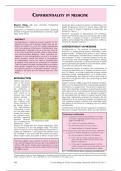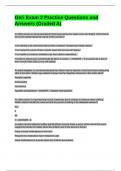Confidentiality in medicine
Sharon Kling, MB ChB, DCH(SA), FCPaed(SA), statement about respecting patient confidentiality. The
MMed(Paed), MPhil Health Professions Council of South Africa (HPCSA)
Department of Paediatrics and Child Health, Tygerberg Ethical Rules of Conduct regarding confidentiality are
Children’s Hospital and Stellenbosch University, Tyger- detailed in Figure 1.3
berg, South Africa However, according to Beauchamp and Childress,
‘Some commentators ridicule such official rules as little
more than a ritualistic formula or convenient fiction,
ABSTRACT publicly acknowledged by professionals but widely ig-
Confidentiality in medicine ensures respect for the nored and violated in practice.’4
patient’s privacy and improves health care by en-
abling the patient to trust the health professional CONFIDENTIALITY IN MEDICINE
with very personal information. Confidentiality may
be breached if required in terms of the law, such as Confidentiality is ‘the practice of keeping harmful,
in the case of gunshot wounds, child or other abuse shameful, or embarrassing patient information within
and communicable diseases. Other justifiable ex- proper bounds.’5 It differs from privacy in that it always
ceptions to the confidentiality rule are in an emer- entails a relationship. Confidentiality in medicine serves
gency situation, where the patient is incompetent two purposes.6 Firstly, it ensures respect for the pa-
or incapacitated, and in the case of psychiatrically tient’s privacy and acknowledges the patient’s feeling
ill patients who need to be committed to hospital. of vulnerability. Secondly, it improves the level of health
The final reason to breach confidentiality is to protect care by permitting the patient to trust the health profes-
third parties, whether this is concern for the safety sional with very personal information.
of a specific person or in the public interest. Two ex- The essential reasons to support the maintenance of
amples of the latter are the Tarasoff case and HIV/ medical confidentiality are: (i) respect for patient auton-
AIDS. omy; (ii) fidelity, i.e. acting in good faith to keep implied
promises; and (iii) consequentialist, i.e. if doctors main-
tain confidentiality, then patients will be more likely to
INTRODUCTION trust them and tell the truth, thus promoting the best
‘What I may see or consequences.4,7
hear in the course Siegler,6 writing in 1982, argued that ‘Medical confiden-
of the treatment tiality, as it has traditionally been understood by patients
or even outside of and doctors, no longer exists. This ancient medical prin-
the treatment in ciple, which has been included in every physician’s oath
regard to the life of and code of ethics since Hippocratic times, has become
men, which on no old, worn-out, and useless; it is a decrepit concept’.6
account one must He discovered that his patient’s medical records might
spread abroad, I have been legitimately accessed by between 25 and
will keep to my- 100 persons at the university hospital, and pointed out
self, holding such that improved hospital medicine and expanded health
things shameful to care teams all contribute to a changing view of medical
be spoken about.’ confidentiality.
The doctor-patient Confidentiality in South African hospitals is no different.
relationship is built Famously, medical information about the late Minister
on trust and neces-
sitates that the doc- Professional confidentiality
tor maintains confi-
13. (1) �A practitioner shall divulge verbally or in writing
dentiality regarding
information regarding a patient which he or she
personal informa-
tion, as stated in the The Hippocratic Oath
ought to divulge only –
Hippocratic Oath.1 (a) in terms of a statutory provision;
Doctors no longer take the original Hippocratic Oath, (b) at the instruction of a court of law; or
but variations of it are still pledged today. The Decla- (c) where justified in the public interest.
ration of Geneva of the World Medical Association in-
(2) �Any information other than the information referred to
cludes the statement, ‘I will respect the secrets which in subrule (1) shall be divulged by a practitioner only –
are confided in me, even after the patient has died.’2
Most modern oaths and codes of ethics include some (a) with the express consent of the patient;
(b) �in the case of a minor under the age of 12
years, with the written consent of his or her
We have added a new section on ethics to the jour- parent or guardian; or
nal, and are hoping that we can get it accredited for
(c) �in the case of a deceased patient, with the
ethics CPD points. Kindly send submissions or sug- written consent of his or her next-of-kin or the
gestions for topics to the section editor, Sharon Kling, executor of such deceased patient’s estate.
at sk@sun.ac.za
Fig. 1. HPCSA Ethical Rules regarding confidentiality.
Correspondence: Dr Sharon Kling, Department of Paediatrics and Child Health, Faculty of Health Sciences, Stellenbosch University, PO Box
19063, Tygerberg 7505. Tel +27-21-938-9506, fax +27-21-938-9138, e-mail sk@sun.ac.za
196 Current Allergy & Clinical Immunology, November 2010 Vol 23, No. 4





